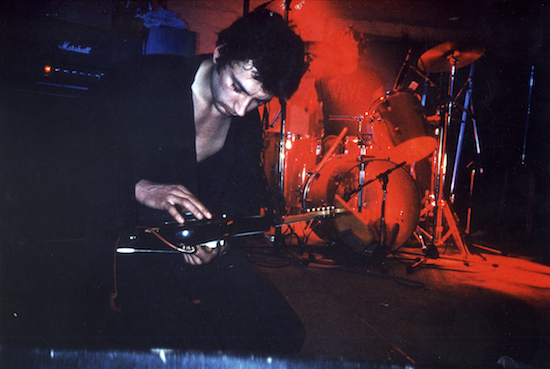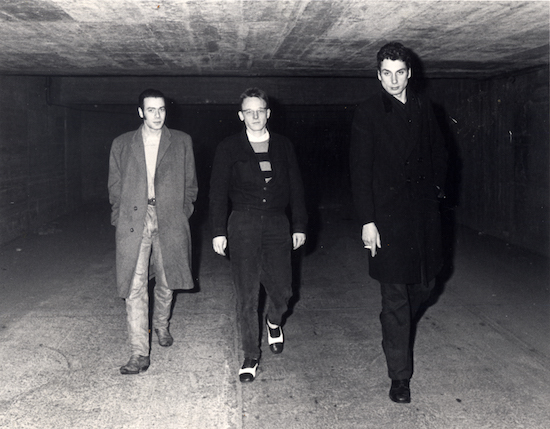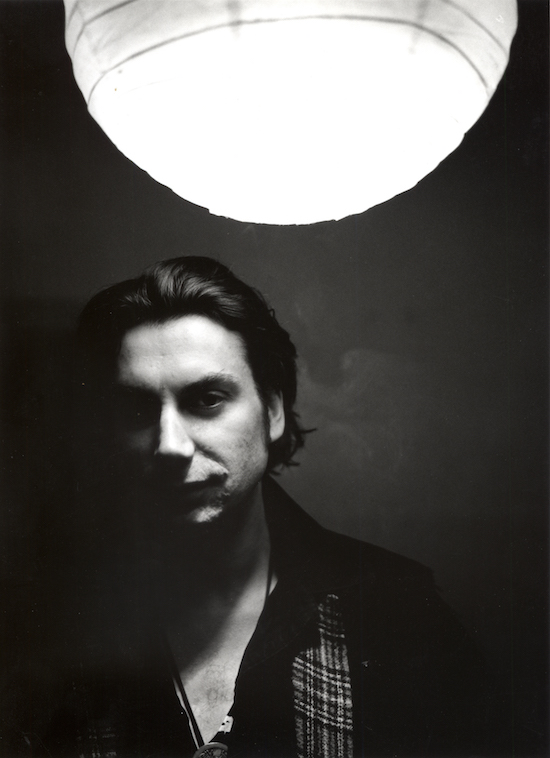Portrait by Burghard Peters
Caspar Brötzmann Massaker plays Oslo in Hackney on November 8
Throughout his career Caspar Brötzmann has made music that is difficult to categorise. With his musical vehicle Massaker, the German guitar player has not so much balanced influences as forged his own path. It is clear he has not wanted to live confined by any particular musical genre, or that he has even sought for solace in the thin boundaries between different styles of music; even these he rebels against. That is how the sound of Massaker appears to be spread so far and wide. The result is intriguing, clearly on some levels Massaker are a rock band (albeit a rock band with a no-wave twist). But there are no anthems here, no power ballads; the weight of Massaker is relentless with a tentacular aspect which can lash out with fierce power. They inherited their energy from the aftershock of punk, but they do not conform to its other norms; they don’t sacrifice technical aptitude for raw emotion. The playing and performance of the band mirrored free rock with its improvisational aesthetics, but their music was full of structures. Massaker would not compromise one side for the other.
It has been more than three decades since The Tribe and Black Axis were first released. To put that in perspective, when these albums were being recorded Germany was split in two. And it still feels as if these works were released just yesterday, appearing as adventurous and forward thinking as when they first saw the light of day.
But how did Caspar Brötzmann find his path? In order to find that out we need to travel back to the his early years, before Massaker and actually before he even played guitar. He was born in 1962 in Wuppertal and brought up in a musical household. This interest was the direct result of environment: “The house was full of music. Maybe hausmusik or funk records, The Beatles and more."
But Brötzmann this was not enough and he took up the piano: “Just for a short time, when I was 11 or 12. I was a kid and when staying at home I would play the piano just for fun." The main inspirations for picking up the instrument and trying to play were quite different from the sound his future band would make, but he still displayed an eclectic taste: “The music from Hanns Eisler and the singer Ernst Busch. It was the compositions of Eisler that I liked a lot as a kid, so I jumped on the piano and tried to play the same and the melodies, but just for a short period."
The pivotal moment arrived when a family friend showed him a few things about the guitar: “When I was young about 14 years old, Hans Reichel showed me how to repair a guitar. He showed me how the electric guitar functions. He showed me how to tune the strings in flat position and explained how the pickups and the tremolo work and a few other practical things on the mechanics." And there were some tricks of the trade: “He showed me just a few riffs to play blues and on solo playing a few tricks you can do with your fingers.” Of course Reichel was not a simple guitar tutor, but a famed guitarist in his own right, known as an improvisor and thought to be one of the most radical guitar players of the 90s. Furthermore, Reichel was also someone that deeply understood the instrument he was using, to the degree that he was also capable of building his own instruments. Therefore the most important knowledge he passed on to Brötzmann was “how to understand the instrument, how the instrument is built and the function of the electronic components”.
Considering the type and quality of music he would go on to release after these brief sessions, it appears that he never forgot those lessons and he would go on and practice playing for about six to eight hours a day. Even to this day Brötzmann retains this discipline: “I am a musician and most of the time I just play my instrument. As you get older, you have more experience you can play things better. I do feel I am getting better and better with my instrument as time passes and for that reason practicing is the most important thing." Even if he is having a bad day, when he is not really feeling it: “If I feel like I am not playing well I will try and be better the next day, as I have been doing my whole life.”
If the initial inspiration for Brötzmann came naturally from his own environment, when it came to finding his own path, there was a different drive: “For me the problem I had was that on one side [there was] my father Peter, who is a free jazz musician, and on the other side there was Jimi Hendrix and that scene, which was really heavy. So at that time I felt it was more important to find my own way." His father is of course Peter Brötzmann, famed saxophonist who rose to underground prominence in the late 60s and remains a revered figure in free jazz today. And so the process for Caspar Brötzmann of coming into his own was difficult, but it gave him a clear purpose: “It was a bit helpless, but it was good. My interest in the guitar was to not be the same as others. To not play like other people, and to not sound like other musicians. That was too boring for me. For me the interesting part was to find something new. To find my own vision of how to play the guitar."
In the mid 80s Brötzmann put Massaker together. The most important aspect of the band was the feeling and imagery that the music would awaken: “Massaker was not necessarily a new idea. I think that if you were to see Led Zeppelin back in the 70s in their practice sessions they would be basically jamming. We did the same too, but maybe the atmosphere and the pictures [the music created], how you bind together the music and time [were different]. With Massaker we had the same rules in the studio as if we were on stage. This music is best to play together. It is good for the timing, for the feeling, for the music. You play together and you see the other person’s face and signs, and how the drummer is hitting the cymbals and to see how the music is coming alive at that moment. Massaker started with drummer Jon Beuth and he had a the time a small, private studio where we made our first recordings and demo tapes." Through these first steps Massaker would go on to sign with the Berlin based label Zensor to release their debut record The Tribe.
From their very first album it felt like Massaker had hit the nail directly on the head. The mystical and ritualistic procession of the title track introduced The Tribe to the world, and from that point on it was a complete annihilation. The drunken progressions of ‘Blechton’ and ‘The Call’ would blend into the noisy renditions of ‘Massaker’ and semi-atmospheric sceneries of ‘Time’, highlighting the multifaceted core of this work. Still, Brötzmann would not remain static and through the years the band’s sound would evolve through various manifestations: “There are a lot of bands that have a certain direction and they stay on this path, but I cannot find this in the sound of Massaker. What I hear from people is that every Massaker record is different.”
That is a fact, considering the band’s next work, Black Axis, a record with an even more adventurous edge and with Brötzmann providing a guitar clinic: “Black Axis and Home, these records are really good in terms of the guitar playing, while the other ones are more like painting pictures and there is a different atmosphere." Opener ‘Die There’ is the perfect example of the varied arsenal at Brötzmann’s disposal, as he turns from feedback crafting to rock riffs and licks to scratchy playing in a series of fluid motions. But it is during moments like ‘Hunters Song’ and ‘Mute’ where the guitar shines through the artist’s exploratory sense. And so Massaker would keep going, releasing one record after the next and building an impressive discography, but unfortunately that would come to an abrupt end.

Live photograph by Karin Aderhold
The band went into hiatus following the release of Home in 1995. Brötzmann would go on to release a record on his own in the shape of Mute Massaker, but after that it was radio silence: “1999 was a hard time for me because Rough Trade [Our Choice/Zomba] closed. After that time I did not have a record company for a long time”. However the rescue came from a different direction, a more underground oriented label in Southern Lord: “Even though I was with other record companies, Southern Lord is the first new base home that I have had since Rough Trade. I am happy about that, I like Sunn O))). I like the atmosphere and the whole gang around Southern Lord." This collaboration came to be as the European branch of Southern Lord included some admirers of Brötzmann’s music: “Guy [Pinhas from Southern Lord EU] is a fan of Massaker and he was always telling me how I should come to Southern Lord." At first there was some reluctance on Brötzmann’s part, with regard to the timing and trends of that era: “At that time the original Massaker still existed, but we were not really in the mood. There was too much dark metal and heavy metal and punk rock and it did not feel right." However, it was a different re-release from Southern Lord, one from a different iconoclastic band, that convinced Brötzmann: “After waiting for years they released Magma. That was Guy’s idea and his next idea was to re-release Massaker. So he wrote me a letter and we became friends through email, then he made the trip to Berlin, we had a very nice meeting and I signed to Southern Lord.” And that is how everything would come full circle with The Tribe and Black Axis seeing the light of day once more this year, with the rest of the band’s discography soon to follow.
However, there was another side effect to this series of events, something that reinvigorated Brötzmann’s interest in making music. Since that time he has once more become active having recently worked amongst others with Massimo Pupillo of Zu: “A few years ago the promoter from A L’Arme! Festival had this idea of this trio [with Pupillo and Alexandre Babel] and we did a live LP on Karl Records. Half of what we did has been released and we are waiting for a good time to release volume two."
But, that was just the start and Brötzmann now continues to collaborate with others from the current generation of heavy, experimental musicians. These include some truly majestic live performances with Sumac: “Aaron [Turner] wrote a letter to the record Southern Lord Amsterdam record store and Guy passed it to me. It was a really nice handwritten letter and it is not often you get one like that. I listened with my son to SUMAC and the new record and I liked it. So that was the inspiration, so I wrote an email just enquiring if Sumac or Aaron are in the mood for a jam session, and the band agreed.” They have already shared a stage in Berlin and recently at Roadburn; Brötzmann will also be performing soon, supporting the mighty Sunn O))), in what can only be a powerful combination.
But apart from these collaborations, he is also starting some new projects and changing up a few things: “Recently I changed over from the guitar. With my new band Bass Totem I am playing bass but not in a normal way. I basically play guitar on the bass." Once more it was a combination of factors that caused this switch of perspective: “My wife was playing bass 15 year ago and so sometimes I played as well. I know Oliver Riedel, the bass player in Rammstein and he let me borrow his bass last year. I was reluctant to play on that heavy metal instrument at first but now I think it is one of the best things I have ever played. He was the one to bring me to the Sandberg fold. Sometimes the world is small.”

Massaker on tour by Michael Böhl
So what about Massaker? As Southern Lord is re-releasing the rest of the band’s full discography in July, Brötzmann had to listen back and approve the new pressings. What did it feel like listening to these records again? Did the sound dated? As one would presume that was not the case: “We had to listen to the test pressings of Der Abend der schwarzen Folklore and Koksofen. Sitting in the studio there was a strange timeless feeling. The emotion was as if we had just made these recordings yesterday. To listen to Massaker by myself it felt as if no time had gone by and that was strange." This epiphany and sense of realisation had a definite impact and it led to a very welcome announcement: "It was one of the reasons for me to consider playing live for the next two years with Massaker. The music is current and it fits the times we are living in.” He is already thinking about the tour and making plans, trying to find the right balance for the upcoming performances: “What I will try to do on this tour is play more songs, and I am working on that now. How to play our songs in a good way but a little shorter so we can play for 90 minutes but within that time play more songs. I think it would be good for the audience, and I definitely would like to play ‘Bass Totem’, ‘Mute’, ‘Black Axis’ and ‘Sarah’.
Despite this fantastic news there is an unfortunate caveat to the announcement in that Massaker is on borrowed time: “When Southern Lord re-released the records I was with my new project on the road. So we have made a decision with Bass Totem to take a step back and I will go on tour with Massaker in 2020. And it will be the final, exit tour of Massaker, so we can say goodbye in a good way to all the fans of that band. Our time will then be over.” In order to give the appropriate farewell, Brötzmann will be accompanied by a very familiar face: “So Massaker exists for the next two years and the original bass player [Eduardo Delgado Lopez] is still in the band. It is a shame that Danny [Arnold Lommen] is not playing drums anymore. He is doing other things, taking care of his family. We are still all friends but he is not playing drums anymore, so we are looking for a new drummer." This whole announcement has a bittersweet taste to it. Just as Massaker were again given the stage, the magic of their five records put again on the spotlight, that is when their time is coming to a close. Still, there is one last ray of hope that Brötzmann allows to shine through: “We are playing live a few new songs. There is an interest from Southern Lord, and we will talk about that.” So, it appears that listening to new material and a brand new release from the band is still a possibility.
Everything comes full circle, even if it takes a while longer. Massaker and Brötzmann did not only release fantastic albums, but their unique take on the rock form and heavy music influenced the current generation of experimental musicians. And it is almost endearing to see that the scene that they helped influence, the scene that their sound nurtured return the favour. It will be the appropriate ending for one of the most innovative acts in heavy music, a series of events that solidifies their legacy and keeps it forever away from obscurity.
Caspar Brötzmann Massaker plays Oslo in Hackney on November 8
Caspar Brötzmann Massaker reissues of The Tribe and Black Axis are available from Southern Lord with the rest of the back catalogue available from July
Caspar Brötzmann [solo] will be supporting SunnO))) in Germany in July


